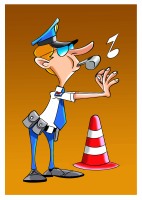How to be a Cop or a Police Officer
One of the questions kids have is how to be a cop. Becoming a cop or a police officer is a rewarding but demanding career that requires a combination of education, physical fitness, and personal attributes. Here's a guide for homeschooling teenagers or parents of kids interested in pursuing a career in law enforcement:

For Teenagers:
1. Focus on Education:
- Complete your high school education focusing on subjects that enhance critical thinking and communication skills. Subjects like civics, criminal justice, or psychology can be beneficial.
2. Stay Physically Active:
- Maintain a good level of physical fitness. Law enforcement careers often require physical agility, so exercise regularly and maintain a healthy lifestyle.
3. Build Character:
- Develop qualities such as integrity, honesty, and responsibility. These attributes are crucial for a successful career in law enforcement.
4. Participate in Community Activities:
- Volunteer or participate in community activities. Being involved in your community demonstrates a commitment to service, an essential aspect of police work.
5. Seek Leadership Opportunities:
- Engage in training that lets you develop leadership skills. Whether through sports, clubs, or community organizations, leadership experience is valuable in law enforcement.
For Homeschooling Parents:
1. Encourage Physical Fitness:
- Support your teenager in maintaining physical fitness. Encourage regular exercise and engage in activities that promote a healthy lifestyle.
2. Teach Responsible Decision-Making:
- Emphasize the importance of responsible decision-making. Discuss scenarios that require critical thinking and ethical considerations.
3. Explore Criminal Justice Topics:
- Introduce your teenager to criminal justice topics. This could involve watching documentaries, attending local law enforcement events, or exploring online resources about the profession.
4. Provide Opportunities for Community Involvement:
- Offer opportunities for community involvement. Whether volunteering or participating in neighborhood initiatives, community engagement is a positive aspect of a future law enforcement officer's profile.
General Steps for Becoming a Police Officer:
1. Meet Minimum Educational Requirements:
- Most police departments need, at the very least, a high school diploma or equivalent. Some departments may prefer candidates with college degrees in criminal justice or related fields.
2. Maintain Physical Fitness:
- Stay in good physical shape. Police academies and hiring processes typically have physical fitness requirements, so regular exercise is crucial.
3. Build a Strong Character:
- Demonstrate solid moral character and integrity. Background checks are a standard part of the hiring process, and individuals with a history of dishonesty may be disqualified.
4. Acquire a College Degree (Optional):
- While not always mandatory, obtaining a college degree can enhance competitiveness. Consider seeking a degree in criminal justice, sociology, or a related field.
5. Complete a Police Academy:
- Successful candidates must complete a police academy training program. These programs cover various aspects of law enforcement, including legal procedures, self-defense, and community relations.
6. Pass the Certification Exam:
- After finishing the police academy, candidates must pass a certification exam to become a sworn police officer.
7. Gain Practical Experience:
- Many police departments require candidates to gain practical experience as a probationary officer before achieving permanent status. This period involves supervised on-the-job training.
8. Specialize or Advance (Optional):
- After gaining experience, officers may choose to specialize in areas such as investigations, narcotics, or community policing. Advancement opportunities may include promotions to supervisory or administrative roles.
9. Stay Informed and Updated:
- Law enforcement is a dynamic field, and officers should stay informed about laws, policies, and procedures changes. Continuing education may be required to maintain certification.
10. Engage with the Community:
- Foster favorable associations with the area you serve. Effective communication and community engagement are essential components of modern policing.
It's important to note that standard requirements may vary by jurisdiction, so individuals interested in becoming police officers should check with law enforcement agencies in their respective areas for precise information on the hiring process and qualifications.

Some of our Homeschool Resources
I have some homeschool resources below that I have compiled for myself and also for my friends and everyone else who wants to get some information about homeschooling. The ones just right below are the ones that our family has used or is still using:
The Good and the Beautiful - A curriculum that uses completely clean and powerful literature, combines subjects for more significant learning and shorter school times, is entirely open-and-go, is academically strong and very thorough, emphasizes God, nature, and high character, is visually beautiful, engaging, and meaningful.
Khan Academy - They give students practice exercises, instructional videos, and a personalized learning dashboard that assigns learners to study at their own pace in and outside of the classroom. They tackle math, science, computer programming, history, art history, economics, etc.
empowers
Rosetta Stone - Language other than English. They are committed to transforming lives through language education. Its digital solutions promote effective learning outcomes for learners at home, schools, or workplaces worldwide.
Project Based Homeschooling - The same educational values are applied to home learning. It combines personal interests with long-term, deep, complex understanding. It is a way of knowledge centered on making, doing, sharing, collaborating, and acquiring fundamental skills.
Mathletics - the next generation in learning, helping students enjoy maths and improve their results. Mathletics covers the Kindergarten to Year 12 curriculum.
Skwirk Interactive Schooling - covers the core subjects studied in Australian primary and secondary schools, including Math, Science, Technology, English, History, and Geography.
Musiah - We use this for our Music. This is an Online Piano Lesson with the world's first A.I. Virtual Piano Teacher. The lessons are suitable for students of all ages.









